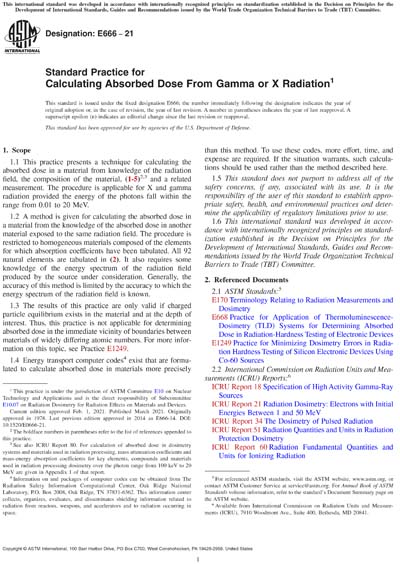Most recent
ASTM E666-21
Standard Practice for Calculating Absorbed Dose From Gamma or X Radiation
1.1 This practice presents a technique for calculating the absorbed dose in a material from knowledge of the radiation field, the composition of the material, (1-5)2,3 and a related measurement. The procedure is applicable for X and gamma radiation provided the energy of the photons fall within the range from 0.01 to 20 MeV.
1.2 A method is given for calculating the absorbed dose in a material from the knowledge of the absorbed dose in another material exposed to the same radiation field. The procedure is restricted to homogeneous materials composed of the elements for which absorption coefficients have been tabulated. All 92 natural elements are tabulated in (2). It also requires some knowledge of the energy spectrum of the radiation field produced by the source under consideration. Generally, the accuracy of this method is limited by the accuracy to which the energy spectrum of the radiation field is known.
1.3 The results of this practice are only valid if charged particle equilibrium exists in the material and at the depth of interest. Thus, this practice is not applicable for determining absorbed dose in the immediate vicinity of boundaries between materials of widely differing atomic numbers. For more information on this topic, see Practice E1249.
1.4 Energy transport computer codes4 exist that are formulated to calculate absorbed dose in materials more precisely than this method. To use these codes, more effort, time, and expense are required. If the situation warrants, such calculations should be used rather than the method described here.
1.5 This standard does not purport to address all of the safety concerns, if any, associated with its use. It is the responsibility of the user of this standard to establish appropriate safety, health, and environmental practices and determine the applicability of regulatory limitations prior to use.
1.6 This international standard was developed in accordance with internationally recognized principles on standardization established in the Decision on Principles for the Development of International Standards, Guides and Recommendations issued by the World Trade Organization Technical Barriers to Trade (TBT) Committee.
Content Provider
ASTM International [astm]






